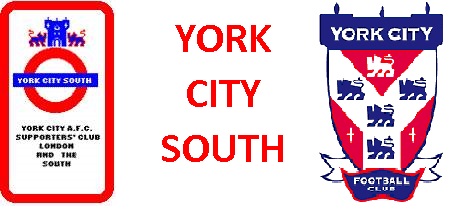

Marco Gabbiadini
Born in Nottingham in 1968 to an English mum and Italian dad. Denis Smith tempted Marco to leave the Lower 6th form of Nunthorpe School in York in late 1984 to sign apprenticeship forms with City. Marco made his City debut in a 3-0 Friday night home defeat to Bolton in March 1985. I recall him spurning at least 3 good chances in the game. He immediately looked class and had a striker’s instinct for goal (if not the finishing). An exception was when he became the youngest player to score a hat trick for York City, at the age of 18, in an Associate Members' Cup victory over Darlington on November 25th 1986. As City struggled to avoid relegation in Denis Smith’s final season, 1986/7, so did Marco. His class was readily apparent, but goals were elusive. Smith left in the summer of 1987.
By that September, Gabbiadini had scored 18 goals in 71 appearances (and become the youngest ever player to score a hat trick for City) when Smith’s Sunderland made an £80,000 bid that we couldn’t refuse. Thrust straight into Sunderland’s first team, he was an immediate success, his willing running allied to his immense skill alongside the guile of veteran striker Eric Gates saw him end the season with 21 league goals as Sunderland were promoted in their first season down in the old Division 3.
Promotion saw no downturn in his scoring. It took 2 seasons for Sunderland to reclaim their place in the top fight, a memorable goal being in the play off semi final at Newcastle. Although Sunderland lost the final, they were awarded promotion when Swindon was found guilty of financial irregularities.
Life in Division 1, the top flight, was harder, both for Gabbiadini and Sunderland. Sold for £1.5m (*) to Crystal Palace, as a replacement for Ian Wright, he struggled and joined Derby a few months later. In his 5 years at Derby, he saw them regain their place in the top flight, by then the advent of The Premiership and new money saw Derby invest heavily and Gabbiadini's chances became more limited. Loans, a spell in Greece and a return to Stoke saw him become a bit of a drifter. Returning to City in February 1998, he failed to impress on a short term contract. Alan Little felt he had nothing to offer and allowed him to leave at the end of the season.
Still only 30, many thought it would be the end of his professional career. He proved his many doubters wrong. He was to regain form in spells at Darlington, where he was voted their all time best player, Northampton and Hartlepool, scoring 78 league goals in over 200 games over the next 5 and a half years, eventually retiring when he hit 36.
Although he won England B and England 21 honours, is probably fair to say he never quite fulfilled the promise he had shown at an early age. He just failed to make the grade in the top flight. Just short of 6 foot, he wasn’t big, but he was quick, strong and powerful. On his day, his speed and sense for goal made him a feared striker and more than a handful for many defences.
City also sold Marco’s younger brother, Ricardo to Sunderland for £5,000. Considered to be a better prospect by City’s youth coaches, Ricardo’s career never took off and he drifted around the lower leagues for several seasons without toomuch success.
(*) As ever, transfer fees are variously reported, the consensus was £1.5m but a few later reports quoted £1.8m. What is clear is that City had inserted a 25% sell on clause in his sale netting City a healthy £355,000 (based on the lower value) when he left Sunderland for Palace.
Footnote: A contemporary of Marco's at Nunthorpe would have been Paul Smith, son of Denis and a few years earlier, Paul McGuinness, son of Wilf was briefly a pupil. Across the city, York's other "traditional boys' grammar school, Archbishop's was home to Brian Pollard and Josh Easby.
